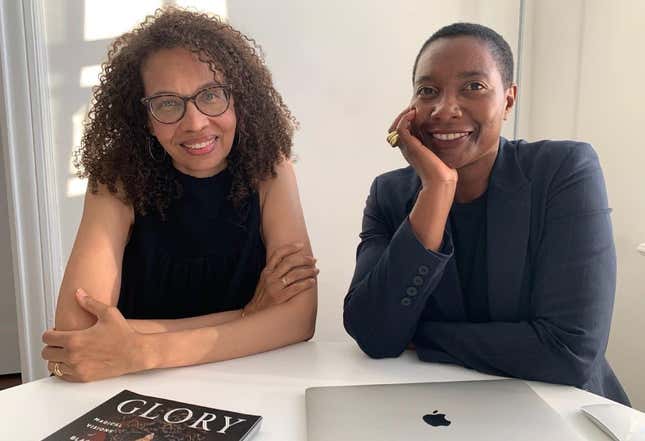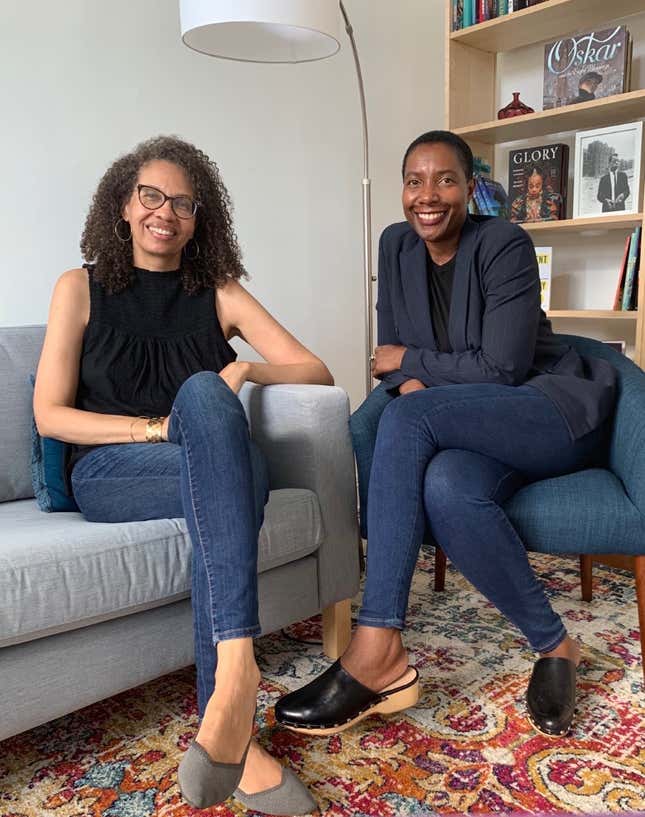
On the social media surface, the country is engaged in a big embrace of Blackness. Companies vowing to hire and advance more Black staff. Philanthropists pledging hefty donations to Black organizations. Editors making space for Black stories in mainstream, notoriously vanilla publications. After years under indictment for its willful whiteness and undermotivated diversification, the publishing industry remains one of the litmus tests for the outpouring of inclusion. Almost 80 percent of its staff and decision-makers are white and mostly women; only 5 percent are Black.
Literary agent Tanya McKinnon and editorial director Carol Taylor, the collaborative business and industry savvy that powers New York-based McKinnon Literary, know the numbers because they live the numbers. Both observe this Negro-in-vogue moment with the polite indifference of practiced professionals who have supported and signal-boosted the perspectives and genius of Black writers for more than 20 years respectively. They believe in and cheerlead equity, of course, but they’re less interested in identifying who isn’t checking for Black authors when they have consistently been the ones who do.
“If we look at the history of race in this country, we see a suppression of Black intellectual recognition in all fields, but particularly in higher education and work that’s expressly intellectual,” said McKinnon, who counts academics and journalists among the agency’s clientele. “So it’s not surprising that publishing has taken longer than, say, music to catch up with more broad-based representation of voices of color in general and Black voices specifically. I think this idea has been changing over the last 20 years, although there’s still a lot of work to be done.”
McKinnon Literary’s roster is an upper echelon of Black deep-thinkers, community-aligners, movement-makers and thought-shapers: Alicia Garza. Imani Perry. Michael Eric Dyson. The Root’s own Very Smart Brotha Damon Young. They shepherded Brittney Cooper’s Eloquent Rage to the marketplace—one of four New York Times bestsellers to McKinnon’s credit—and sold They Were Her Property, historian Stephanie Jones-Rogers’ examination of white women slave owners in the South. White writers wanting not to produce the latest tone-deaf literary misstep have come to McKinnon for her candid advisement on their approach to concepts related to race, gender and culture. So in 2020’s intense social climate, many of the books she’s represented have resurged in McKinnoboth popularity and importance.
Prior to establishing her six-year-old agency, McKinnon was an agent at Mary Evans Inc., but after she gave birth to a daughter and returned from an extended maternity leave, she realized that the key to autonomy was to manage the moving parts of publishing that she never envisioned herself doing. “That proved to be extremely rewarding on multiple levels,” she said. If she wanted to help authors she admired, whose ideas and talent warranted a fair shot in trade publishing, she needed to become a boss. So she did. Three years in, she asked Taylor, a former senior editor at Random House, to join her.
“What’s really helpful—in a way that was not sustainable for me in corporate America—is that we don’t have to translate what we’re thinking the way we might have had to do in a board meeting. We’re good at different things and we run hot and cold at different times,” said Taylor. “Sometimes partnerships can run into problems with redundancies and people trying to outdo each other. I like to say that Tonya is the engine that keeps us moving forward and I keep us on the track. She’s really a big idea person and I’m great at operations, the one who’s putting things in place to focus her. We’re complementary in that regard.”

Owning and working at an agency that they built themselves—which also staffs another agent, an entertainment attorney and an intern—gives them the freedom to respond to issues like a global pandemic or an industry-wide recession in a way they wouldn’t have been able to, had they been under someone else’s employ.
“We’ve worked for other people and we love the way in which we can be nimble, the way in which we can be selective, the way in which we are accountable to one another,” McKinnon added. “We’re both really hard workers and self-starters, we trust each other implicitly, and we’re friends and colleagues. At the end of the day, we’re answering to another Black woman. That’s powerful for us.”
McKinnon and Taylor specialize in literary fiction and narrative, intellectual nonfiction. What catches their interest most are fresh ideas, taking on new perspectives of already-explored issues and storytelling that connects readers to high concepts, and they live to highlight the diversity of Black people and the Black experience. Still, not all Black writers have faith in Black agents and even though any author should be free to make the best, most unpressured choice for their project, McKinnon thinks external factors inform the mindset that ultimately informs that decision-making.
“The first and most obvious is that there aren’t a lot of agents of color. Second, this business is based largely on referrals and many writers get their referrals from other writers who are represented by white agents, so the cycle self-perpetuates,” she said. “There’s also a subset of folks of color who feel more comfortable having a white agent, perhaps a carry-over from a pre-integration notion that Black agents can’t command the same level of advances that white agents can. I’m hoping that the more agents of color there are in publishing and in Hollywood, securing strong deals for our clients, the more this perception will wane.”
More Black authors and their books excel when there’s an inside champion, a knowledgeable advocate, a publishing docent pushing for them. In that case, McKinnon Literary is ahead of the publishing industry—like, more than five years ahead. But the investment they make into their projects and authors is what makes their work gratifying first before it becomes successful second. How the rest of the industry shows up for Black stories is a revelation in progress. McKinnon and Taylor will continue to elevate the literary voices we’ll always be waiting to hear.

